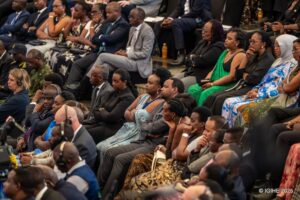President Paul Kagame has urged Rwandans to remain steadfast in safeguarding their dignity amid past injustices and current challenges.
During the 31st commemoration of the 1994 Genocide against the Tutsi on Monday, April 7, Kagame reminded the country that despite the heavy burden of its tragic history and the ongoing distortions of its reality, Rwandans must continue to hold their heads high.
He stressed that Rwanda’s resilience depends on its people’s determination not to be overwhelmed by past trauma or external pressures.
“How do you confront both the darkness of the past and the cruelty of the present?” Kagame posed, highlighting how the Genocide against the Tutsi which took over a million lives three decades ago — remains deeply connected to the country’s current difficulties.
“From the very beginning, we understood these two challenges were intertwined, and we had to confront them together. Either we would be crushed between them, or we would rise and fight.”
Kagame portrayed Rwanda’s perseverance as a strength born from hardship.
“What tried to destroy us 31 years ago only made us stronger,” he affirmed, assuring citizens that the worst is behind them.
“The storm came, we found shelter… it has passed, and we rebuilt. I don’t believe another storm will come and wipe everything away.”
He encouraged Rwandans not to succumb to fear, pointing out that while fighting back carries risk, doing nothing guarantees defeat.
“There’s a chance you might die when you fight back. But if you don’t, you are certain to die,” he warned.
He clarified that defending Rwanda does not mean aggression towards others but standing firm against those who try to mistreat or dominate the country.
“If anyone comes here thinking they can treat us like in the past, I assure you, they will not succeed,” Kagame declared.
The president also criticised foreign powers and international organisations, accusing them of maintaining a “cruel present” through biased actions and unjust narratives.
He expressed his frustration with what he sees as double standards, particularly concerning the Democratic Republic of Congo (DRC) and the plight of Congolese Tutsi refugees in Rwanda.
“They seem content with the situation and expect us to quietly accept it—witnessing hate speech, killings, and displacement of people because of their identity. Many of them are refugees here in Rwanda.”
Kagame noted that Rwanda hosts 125,000 refugees in camps, yet powerful nations select only a few to resettle elsewhere, leaving the majority behind.
He also criticised certain African leaders who, he said, serve foreign interests while their citizens remain impoverished.
“These leaders are praised in Western capitals while their countries drown in poverty,” Kagame said.
Rejecting accusations that Rwanda is exploiting minerals from eastern DRC, Kagame argued that if the claims were true, Rwanda would be wealthy like its accusers and not reliant on foreign aid.
Extending his message to the entire continent, Kagame urged Africans to reject dehumanisation and dependency.
“To my fellow Africans, who face this reality every day I refuse to beg for my existence,” he declared. “When will Africans say enough to this mistreatment? Must we always be told our lives depend on the goodwill of others?”
April 7 is internationally recognised as a day to reflect on the 1994 Genocide against the Tutsi. It is observed worldwide in memory of the more than one million lives lost in just 100 days.
Earlier in the day, President Kagame and First Lady Jeannette Kagame lit the flame of remembrance at the Kigali Genocide Memorial, officially beginning the commemoration week and the 100 days of remembrance events. They also laid wreaths at the memorial site to honour the victims.




